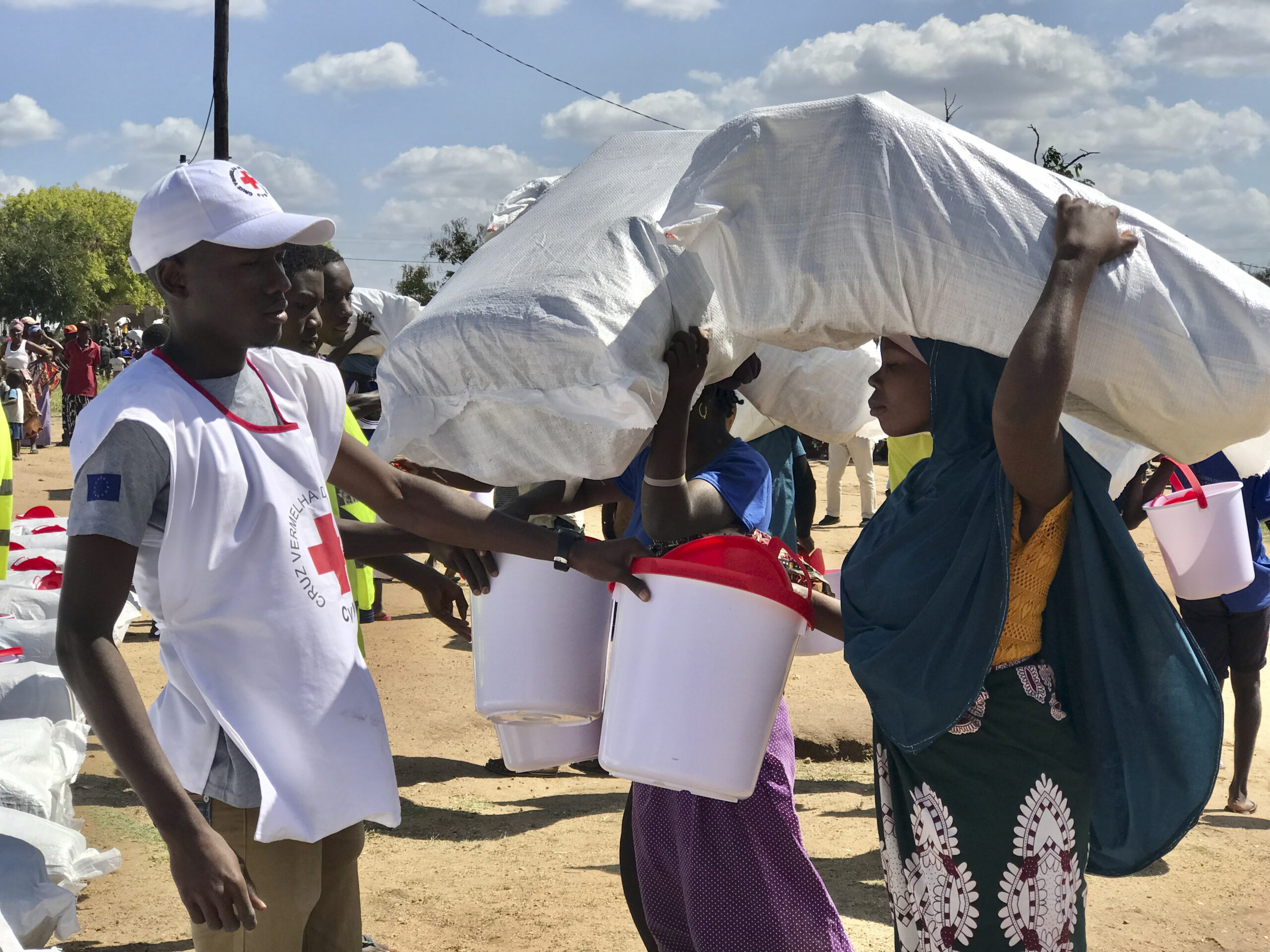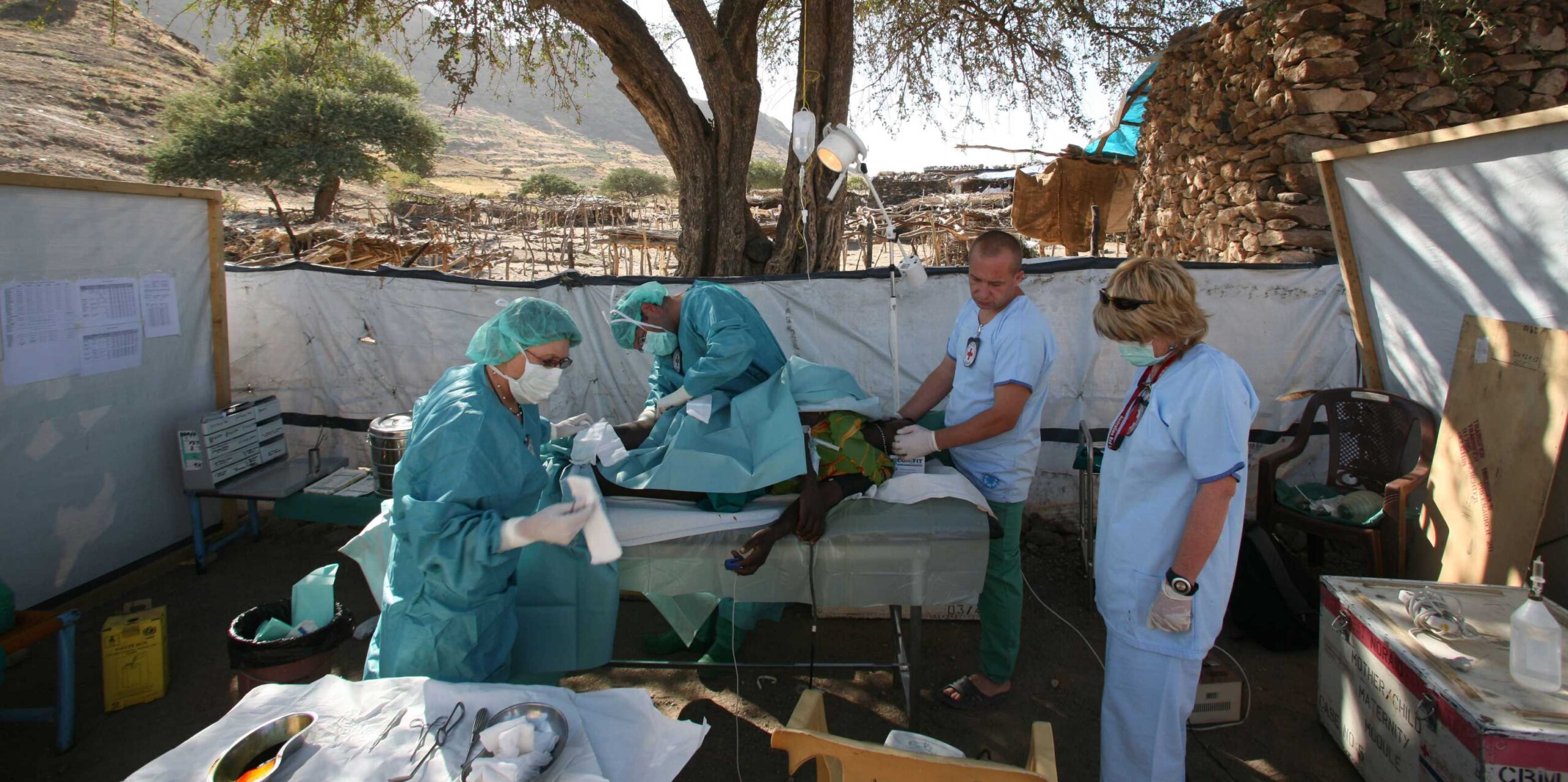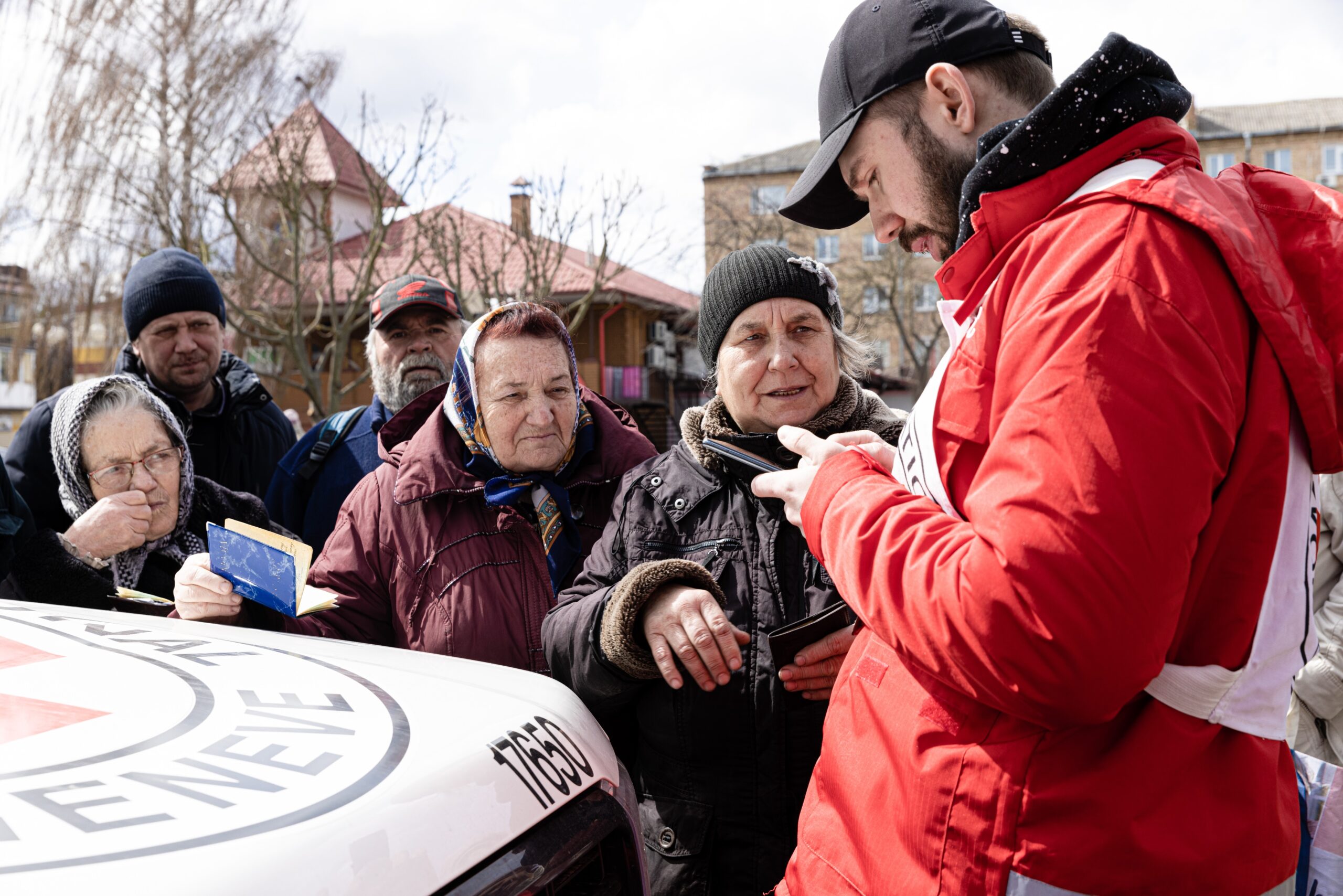The Engineering for Humanitarian Action Initiative, a collaborative effort between ETH Zurich and EPFL and the International Committee of the Red Cross (ICRC), continues to spearhead research to bolster humanitarian efforts worldwide.
With the recent completion of the third call for proposals, the initiative is excited to announce the funding of five promising research projects. These diverse projects span crucial areas of concern, ranging from climate change adaptation and digital conflict protection to healthcare advancements and data-driven humanitarian response. Each project embodies innovation and collaboration, aiming to create sustainable solutions and enhance the impact of humanitarian action.
Protection Framework for Digital(ised) Conflict Environments

For humanitarian organisations such as the ICRC, the digitalisation of conflict environments poses a series of concerns related to physical, societal, and psychological cognitive risks to affected populations. The main objective of this project is to develop a methodological framework that enables humanitarian actors to develop awareness and preparedness of the digital dimension of armed conflict, which will be the basis to design adequate responses to people’s needs. A core deliverable will be a tool that can be used easily by humanitarian workers to better detect and document relevant factors, such as risks and harms, of digitalized conflicts in order to develop adequate protection-centred responses and to state and non-state actors.
Expected Impact: Strengthening the ICRC’s ability to provide adequate protection responses to individuals facing harm due to the digital(ised) elements in conflict settings
Team
ETH Research Group: Dr. Myriam Dunn Cavelty, Center for Security Studies
ICRC Partners: Joelle Rizk, Digital Threats Advisor; Mark Silverman, Digital Transformation and Data Advisor; Philippe Marc Stoll, Senior Techplomacy Delegate
Additional Partners: Dr Camino Kavanagh, King’s College London; Enrico Formica, United Nations
Building Capacity for Climate Change Adaptation
 By focusing on building capacity for climate change adaptation, this project addresses the urgent need to improve construction interventions on existing buildings and adapt them to future climate needs. Through a trans-disciplinary approach, the project aims to enhance construction work on existing buildings, particularly in the areas of energy and water, which present major climate adaptation challenges. The project will develop a global geo-referenced database to inform location-based feedback, combining construction choices, operational needs, and climate data. Additionally, a digital tool will be created to support and monitor the implementation of climate adaptation knowledge by local staff, ultimately promoting adaptive and resilient habitats.
By focusing on building capacity for climate change adaptation, this project addresses the urgent need to improve construction interventions on existing buildings and adapt them to future climate needs. Through a trans-disciplinary approach, the project aims to enhance construction work on existing buildings, particularly in the areas of energy and water, which present major climate adaptation challenges. The project will develop a global geo-referenced database to inform location-based feedback, combining construction choices, operational needs, and climate data. Additionally, a digital tool will be created to support and monitor the implementation of climate adaptation knowledge by local staff, ultimately promoting adaptive and resilient habitats.
Expected Impact: Enabling the ICRC’s construction activities to increase resilience and adaptation to climate change
Team
ETH Research Group: Prof. Dr. Guillaume Habert, Hager Al Laham & Dr. Giulia Celentano, Chair for Sustainable Construction; Prof. Dr. Stefan Pfister, Ecological Systems Design Group; Dr Alina Galimshina, Architecture and Building Systems Group
ICRC Partners: Pavlos Tamvakis, Water and Habitat Unit; Kathrine Vad, Environment and Climate Change Adviser; Francois Thuot, Premises Head of Sector
DISCO-DHRIVE—DIStributed COllaborative learning for Data-driven Humanitarian Response in Insecure and Volatile Environments
 Data collected in humanitarian responses is rarely shared in real-time and is often never shared at all for a range of valid reasons related to privacy, ethics and practicalities. Yet shared data could be extremely valuable to guide the optimization of humanitarian action, evaluate its impact, and improve transparency and accountability. DISCO-DHRIVE seeks to build and validate a privacy-preserving DIStributed COllaborative learning platform to meet the ICRC’s needs and enable continuous learning for data-driven humanitarian responses. The implementation strategy covers: Building a suite of AI models adapted to ICRC needs without sharing any data; adapting the DISCO platform to the specific challenges of humanitarian contexts; and creating a structured dialogue within the ICRC data protection unit to evaluate the technology’s use in routine practice.
Data collected in humanitarian responses is rarely shared in real-time and is often never shared at all for a range of valid reasons related to privacy, ethics and practicalities. Yet shared data could be extremely valuable to guide the optimization of humanitarian action, evaluate its impact, and improve transparency and accountability. DISCO-DHRIVE seeks to build and validate a privacy-preserving DIStributed COllaborative learning platform to meet the ICRC’s needs and enable continuous learning for data-driven humanitarian responses. The implementation strategy covers: Building a suite of AI models adapted to ICRC needs without sharing any data; adapting the DISCO platform to the specific challenges of humanitarian contexts; and creating a structured dialogue within the ICRC data protection unit to evaluate the technology’s use in routine practice.
Expected impact: Enabling the ICRC to be and to remain a trusted manager of sensitive data and information
Team
EPFL Research Group: Dr. Mary-Anne Hartley, Intelligent Global Health (iGH) Group, Prof. Martin Jaggi, Tenure Track Assistant Professor, Machine Learning and Optimization Laboratory
ICRC Partner: Dr. Javier Elkin, Digital Health Coordinator at the Health Department
Point-of-Care Test for the Prevention of Beriberi in Detainees
 Beriberi is a debilitating disease caused by thiamine (Vitamin B1) deficiency that disproportionately affects and has a rapid onset among malnourished detainees. Surveying for thiamine deficiency among detainees in remote areas would improve the efficacy of malnutrition monitoring. Unfortunately, the collection of whole blood, stool and urine samples is impracticable in these areas, making assays based on saliva a highly valuable option. A new test strategy based on immuno-metabolic biomarkers from saliva has been proposed by EPFL for the pre-emptive detection of beriberi. Based on this, the team proposes to develop a salivary point-of-care test to identify detainees at risk of developing beriberi.
Beriberi is a debilitating disease caused by thiamine (Vitamin B1) deficiency that disproportionately affects and has a rapid onset among malnourished detainees. Surveying for thiamine deficiency among detainees in remote areas would improve the efficacy of malnutrition monitoring. Unfortunately, the collection of whole blood, stool and urine samples is impracticable in these areas, making assays based on saliva a highly valuable option. A new test strategy based on immuno-metabolic biomarkers from saliva has been proposed by EPFL for the pre-emptive detection of beriberi. Based on this, the team proposes to develop a salivary point-of-care test to identify detainees at risk of developing beriberi.
Expected impact: Enabling the ICRC to implement point-of-care salivary testing to screen detainees for suspected Vitamin B1 deficiency caused by malnutrition, with other potential applications for the management of malnutrition
Team
EPFL Research Group: Dr. Horst Pick, Senior Scientist at School of Basic Sciences, Chemistry and Engineering
ICRC Partner: Dr. Elena Leclerc, Head of Health in Detention at the Unit for Persons Deprived of Liberty
Additional Partners: Prof. Silue Kigbafori Dieudonné, Research group leader on Environment and Health at Centre Suisse de Recherches Scientifiques en Côte d’Ivoire (CSRS), Dr. René Oka Kouame, Director of the National Nutrition Program Côte d’Ivoire
Emission Reduction in Humanitarian Aid
 Researchers use Life Cycle Assessments (LCAs) to determine real impact of greenhouse gas (GHG) emissions in supply chains and in specific sectors such as energy, textiles or transport. However, there is currently a lack of complete LCAs done in the context of procuring, transporting and disposing of essential humanitarian aid items in the field. To fill this gap, the team will, in collaboration with peers, calculate emission factors for selected humanitarian aid items known to contribute significantly to GHG footprints; outline key parameters to consider optimizing decarbonization of humanitarian supply chains; feed these factors into an open-source database specially-developed for the humanitarian sector, which will be maintained in the future by the Climate Action Accelerator (CAA).
Researchers use Life Cycle Assessments (LCAs) to determine real impact of greenhouse gas (GHG) emissions in supply chains and in specific sectors such as energy, textiles or transport. However, there is currently a lack of complete LCAs done in the context of procuring, transporting and disposing of essential humanitarian aid items in the field. To fill this gap, the team will, in collaboration with peers, calculate emission factors for selected humanitarian aid items known to contribute significantly to GHG footprints; outline key parameters to consider optimizing decarbonization of humanitarian supply chains; feed these factors into an open-source database specially-developed for the humanitarian sector, which will be maintained in the future by the Climate Action Accelerator (CAA).
Expected impact: Supporting the ICRC’s (and the broader humanitarian sector’s) Environmental Roadmap and improving the ICRC’s internal carbon accounting tool as well as the Humanitarian Carbon Calculator (HCC) for humanitarian organizations.
Team
EPFL Research Group: Dr. Klaus Schönenberger, Director of EssentialTech Center, Dr. Cara Tobin, Scientist at EssentialTech and Sascha Nick, researcher at ENAC Laboratory of Environmental and Urban Economics
ICRC Partners: Kathrine Vad, Environment and Climate Change Advisor at the Executive Office of the Director-General
Additional Partner: Bruno Jochum, Director of the Climate Action Accelerator
We extend our gratitude to the funding partners Stavros Niarchos Foundation, the Foundation for the ICRC and Rolex for their generous contributions and to the project teams for their expertise and dedication. We look forward to supporting the progress and implementation of these projects in the coming years.




